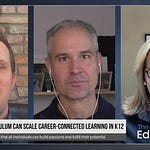Carnegie Learning was perhaps the first company to enter the education technology market with an artificial intelligence (AI) powered math learning solution. CEO Barry Malkin joined me to talk about Carnegie Learning's approach, how the company has evolved since those early days, and how they approach some of the hot button questions in math education. In particular we tackled questions around conceptual learning in math versus memorizing procedures, the grain size at which Carnegie Learning approaches personalizing learning, and what the impact of artificial intelligence is likely to be more broadly. As always, you can listen to the conversation above if you subscribe, watch it below, or read the transcript if you’re a paid subscriber.
Michael Horn:
Today's guest, Barry Malkin, has had a fascinating career at a fascinating perch right now at a company that I got to know very early on in my introduction to the world of education technology, which is Carnegie Learning. We're going to hear a significant update, I think, about what they're up to and as well as frankly some perspective on some of the burning questions that educators are really asking right now around the rise of AI and more, but all in this bigger question because we're obsessed with helping all individuals build their passions and fulfill their human potential. And so Barry, first, it's great to see you. Thank you for doing this.
Barry Malkin:
Well, thank you for having me. It's a pleasure to be here.
Horn:
Yeah, you bet. So let's start with that, just your own background into your current role leading Carnegie Learning and your own journey. I suspect when you started out, that's not something you would've necessarily guessed that this is where you'd be at the moment.
Malkin:
No, probably not. Although, I have enjoyed every moment of it. I've been here for seven years now, and I'm having a ton of fun. We're making huge progress and having a huge impact on students across the country, so I couldn't be more thrilled with what I'm doing. I have had I guess an interesting pathway to where I am today. So I started as an investment banker in New York many, many moons ago focusing on mergers and acquisitions and covering a variety of industries at the time. And so I was in New York for a while. I'm from the Midwest originally. I'm from Milwaukee and a Midwesterner at heart and decided to finally move back to the Midwest and brought my fiance or wife at the time to Chicago with me, who is a New Yorker, so that was a bit of a tough sell, but I was able to convince her. And I got a job working for Deborah Quazzo and Michael Moe, actually. That was my first job in education.
I was working with them, for them at Merrill Lynch in Chicago, and they were building an amazing business services and educational services practice at the time, and I just fell in love with education. I fell in love with the people, I fell in love with, the mission, the entrepreneurialism. It just felt right for me, and I kept rolling with it. So I stayed in investment banking for a while with Deborah and Michael, went to another firm where I also stayed for a while and was advising companies all over the world on capital raising and mergers and acquisitions in education across the spectrum. I made a job transition at that time, and I went to what they call the buy side where I worked for a public company, Career Education Corporation, in their mergers and acquisitions group. And again, working all across the world looking for higher education institutions to purchase at the time.
That was a transition from advisor to principal, and I really, really enjoyed it. To make a long story short, I ended up at Apollo Education Group where I was the global head of mergers and acquisitions there and worked on an acquiring educational technology companies and higher education institutions and even building some product there and doing some strategy work as well. It was a lot of fun. I was there for about six years. One of the acquisitions I did at Apollo was Carnegie Learning. So in 2011, we had a real challenge at the University of Phoenix, which was the largest business within the Apollo Education Group, and that was we were having persistence problems with students getting through basic math education courses, and we needed a solution. We were using products by a number of third parties, and it just wasn't satisfying the requirements, and we were losing too many students too early in their post-secondary education journey.
So we went around, we looked for solutions, and we came across Carnegie Learning. We were fascinated by the work that they were doing, the research that backed the product, the AI and its capabilities, and we ended up acquiring the company in 2011. Again, to make a long story short, the post-secondary industry had lots of challenges, and the integration of Carnegie Learning into Phoenix didn't quite happen in the way we all envisioned it because of lots of distractions and changes in that landscape, but the idea was to obviously improve the outcomes in math, but also to leverage the AI across different subjects and classes throughout the university. So that was the rationale. It was a good thesis, a really good thesis, and a great little business.
In 2015, so I had left Apollo, and I had been gone for about a year, I was doing some advisory work, some personal investing, and trying to figure out my next gig when Carnegie Learning was for sale. So they decided to divest the business when they were taking it private, and I put together a small group, and we bought the business from Apollo. It's been seven years now, and we've completely transformed the organization. I just always thought it was a sleeper. I thought it had great bones, amazing people, great technology, the pedagogy was amazing, and I naively felt that I could do something with it.
Horn:
Well, and you haven't been wrong, so I mean that's your history and coming into it. The history of Carnegie Learning I think is also fascinating because people may know, maybe they don't, but if they don't, it was initially a math-only solution, and if I recall really an algebra-only solution developed out Carnegie Mellon. It was built with AI. As you said, it's really, I think it's fair to say, and we'll get into this later, the first ed tech product with artificial intelligence in it that I'm aware of anyway, and a rigorous curriculum, rigorous backbone, lot of research behind it. It also had a very, at the time, sort of specific, shall we say, classroom models, a little arcane in its early days, but you all have evolved a ton. You have even more research. You're one of the few folks that has a federal government research study behind it showing positive and significant effects on student learning, but what are you all today? It's much broader than math if I look at the website.
Malkin:
Yeah, it is broader than math. And so when I began in 2015, we were simply focused on middle school and high school mathematics, and that had been the business for 20 plus years. And as you said, it started at Carnegie Mellon University. It started as a research project between the School of Cognitive Science, the School of Psychology, and the computer science department, all led by John Anderson who was really the force behind the research that created what was called Cognitive Tutor at the time. That was very early in ed tech days before there were computers in classrooms. And in schools, they weren't prevalent at all, so they were way, way, way before their time, but they had some success rolling it out as a research project within the Pittsburgh Public school system and got a lot of interest in what they were doing from districts across the country. And Carnegie Mellon University is a very commercial university and knows a lot about tech transfer and monetizing intellectual property, and that's exactly what they did with Carnegie Learning and created a company from it.
So we've evolved quite a bit. We first started out as a technology company, we moved into curriculum, and then we also moved into services. So those are really the three legs of our business today. But now we're broadening the business beyond math, but also expanding within math as well. So one of the most exciting things that's happening at the company is the launch of our K-5 math product, which is going to be a blended learning product, much like our existing 6-12 product line. So we're incredibly excited about this. This company has always wanted to do a K-5 math product, and so I'm incredibly excited. The product's amazing. It'll launch officially at the beginning of September, but we're already getting a lot of interest in it.
That's the main thing. We've expanded beyond 6-12 math into K-5, but we've also expanded into literacy as well as world languages as well, and we're putting a lot of effort into improving, reinventing, and wrapping technology around those subjects as well. So we're super excited. We've got a new core 6-12 product coming to market and lots of exciting things happening in the world languages space as well.
Horn:
Very, very cool. So let's dive deep though in the math strand itself because one of the interesting things that you all say is you don't just teach people the what of subjects like math, but you really focus on the why behind it. I can guess what that might mean, but I'd love to hear it from you. What does that really mean? How does that work in a digital learning solution? I think when people think digital learning, they think procedures and computations, but not why. That sounds like something you'd get out of a humanities course. So how are you all doing that?
Malkin:
Look, the whole point of what we do is to strengthen the conceptual understanding of mathematics. We are not a procedural math company. We really believe that students must internalize and understand why they're doing the math, what its proper application is, and when and how to use it most effectively. And if you're just teaching multiplication tables and memorization and manipulating equations, you're not teaching anybody the application of that mathematics, and so that's really what we try to do. We center a lot of our problems around word problems, and I know some students find that more challenging, but at the end of the day, it produces students who understand much, much more about the mathematics and how to apply it in the real world.
If you were a engineer at SpaceX, and you were trying to figure out the aerodynamics of a rocket, an equation is not suddenly going to appear for you to solve that problem. You're going to have to figure out what it is you're solving, the purpose of the math that's necessary to solve that problem, and then only then do the equation. So this is what we do, this is how we teach, and we believe it's by far the most effective way of instruction.
Horn:
So I want to dig in this a little bit more and understand it better because as you know, there's been this big reckoning over the last few years around the science of reading. And for folks tuning in, the importance that you actually have to teach the mechanics of how to read and not just guess based on the pictures near you and so forth. We haven't seen that, I don't think, in math per se. We've seen commissions come along and so forth, but it does seem to me, if I look at it from a high level, that there are some food fights or fractures, if you will, in the world of math. Crassly, I'd say on the one hand you've got folks talking about the importance of learning procedures, getting to automaticity through like, you got to memorize your times tables so that you'll be able to do the higher order math.
And then I think on the other hand, you have the conceptual folks that talk less about the importance of getting the right answer and more understanding the why behind the answer, sort of what are the mechanisms in other words. And I'm just sort of curious, in your answer, it sounds like you're saying both have wisdom, but I'd love to know how you think about the split and fundamentally what's the country getting right and wrong right now about math instruction?
Malkin:
So you said something that was interesting. You said that in the conceptual framework of mathematics, you care less about what the answer is, and I think that's a misconception. We want to get to the right answer, we just don't believe there's a singular path to achieving that answer. Every problem in life has a number of solution sets. It doesn't matter if it's math or any subject or domain. So there is a right answer here, but we want students to be able to prove it out in their own way. It doesn't mean there's a unlimited pathways, we obviously need to instruct the student in the most efficient method, but by stressing the conceptual framework and the ability for student to take their own path, it's only there that we can actually understand where their struggles are and where their misconceptions are. If they're just memorizing math problems and manipulating equations, we can't see the work. And if we can't see the work, we can't really diagnose the specific skills that they're struggling with.
Horn:
That is super interesting. So in other words, it sounds like, yes, I'm doing the procedures, but I want to see your actual work behind it to see the pathways because it may turn out that when I start to do the quadratic equation, you realize Michael actually has a more fundamental problem on understanding exponents or multiplication or whatever it might be, I don't know, factoring. And so using that would say, "Okay, we actually got to go there and maybe it's not a procedural thing, it's like a conceptual. Michael doesn't understand that this is in fact a question of division." Is that sort of how you're thinking about it?
Malkin:
That's exactly right. What's interesting is our textbooks as well as our software utilize the same principles. So even though it's a digital solution, the digital solution is unpacking the specific skills that students are struggling with. And so within any math problem that we're providing within our MATHia software, we could be analyzing anywhere between five and 25 different skills in a single math problem, and we're really looking at those discreet capabilities of the student to understand where their struggles are. So it works our print, in our eBooks, as well as our software.
Horn:
It's fascinating. So this actually I think hits at another tension we see right now in the math... it's not the reading words, we don't have the math words, but I think there's some tensions brewing, and one of them seems to be acceleration versus remediation, like you're going to fix the thing that the kid is struggling with versus we're going to push you through, but we'll sort of loop in to build the skill up that maybe is deficient in the service of that high order thing. I think those are the crass categories, if you will. How do you think about that question? I have a guess based on what you just said, but I'm sort of curious philosophically how you think about the importance of personalizing learning in a subject that's more cumulative maybe than any other subject that's out there.
Malkin:
This is a hot button of this organization, as well as myself personally. So what's happening in math education really way too often is that students are being placed in below grade level content because they are struggling with some component of on-grade level material. And unfortunately, when you take a student and you put them two, three grade levels behind, it could be a life sentence for being behind in mathematics for, like I said, forever. And so what we try to do is we try to remediate the specific skills that they're struggling with. And every student, whether they're an accelerated class or intervention course, they need remediation, but they don't necessarily need to be put in a single or multiple grade levels below where they need to be. And so we think of it as a highway. And the student can get off the highway for a moment or go on a rest stop, but they're getting back on that highway.
Most other companies through remediation, intervention, they're taking them off the highway, and they're putting them on a completely different road. We don't believe that's necessary. We think with the power of our curriculum and the power of our software that we can see specifically where they're struggling and maintain their trajectory on the road, on the on-course level material.
Horn:
It's super interesting. This is my aha thing from hearing you say that, and tell me if I have this right. It sounds like to me, basically you're saying, "When we personalize along the categories of on-grade level or all for fourth grade math versus sixth grade, it's too blunt an instrument. We are tracking people on things that are hard to escape. Whereas when we're personalizing it sort of the atomic level of the specific misconception, then we're being much more precise. We allow for a lot more fluidity." Frankly, once you remediate maybe that one thing I didn't understand from three years ago, I might start soaring now because now everything comes together. Is that the right way to think about it?
Malkin:
Exactly. A hundred percent. Every single student needs remediation at one point or another. The difference is we are keeping them on grade level. We're not sending them down a grade or two. We, that's our whole objective. That's our north star. Keep them on grade level, remediate them where and when it's necessary, but keep them on task.
Horn:
That's awesome. All right, so last topic as we finish up because you all hit on a bunch of the hot button issues in education, and the last one right now is artificial intelligence. It's everywhere. ChatGPT. And is it the end of English and all these questions and math faculty being like, "Now you have a calculator," and all this stuff. So I said it up front, Carnegie Learning was at least as far as I know, perhaps the first solution out in the market with an AI driven solution. So not the first in research, but really out in the market. There's obviously so much hype, excitement, worries around this stuff right now. And it can be beyond your product. How do you think about the use of AI in education? Where's it going to make an impact? Where is it overhyped? And I mean, you probably have a level of nuance that we don't, so what are we missing? What's the media conversation missing about this story?
Malkin:
Yeah. Well look, things are changing so rapidly with ChatGPT, and it's hard to know exactly where it's going to go. I'm not a fortune-teller or Nostradamus, so I don't know exactly. Look, the real challenge of teaching in the classroom is being able to differentiate between all the students and all their different needs because they're all at different places, without question. And so the power of artificial intelligence is the ability to give those teachers some additional leverage to help all of these different students who are at many different places. It's what our MATHia software does, it's what it was built for, and it's really what makes it so special. It's a competency-based framework. Everybody goes through it at their own pace, and it provides that differentiation to really help again scale the teacher's ability. So I think AI is an incredible tool. It's obviously in its infancy, but the power of it and GBT and AI is really around the ability to personalize instruction for every student.
That is the Holy Grail of education to be able to meet every student where they are at any moment. And so I'm very, very excited about the recent developments. It's going to keep us on our toes. We have to continue to reinvent ourselves and continuously improve our products, but I couldn't be more excited about where things are headed.
Horn:
Let me stay on that one bit, and this is my observation. You didn't put me up to it, but I think it's a chance for you all to toot your own horn.
Malkin:
Okay.
Horn:
No pun intended. But as I look at it, one of the things that I've sort of concluded about AI before the ChatGPT stuff came out was that in and of itself, it's not going to deduce causality of what things you've got right or wrong in its own sort of big abstract model. It is best used when it's built on a rigorous curriculum with good assessments that are giving good data into the model, and it has a theory of learning. And when I look at you all, again, you're developed out of Carnegie Mellon, there's a clear theory of how math concepts connect with each other, the importance of understanding the why behind them, how you build that up, all that is there, and then the AI sort of turbocharges it within a model, it seems to me, as opposed to... I mean, we're seeing this right now with Bing and Google getting all sorts of things wrong in the world, which is okay when you're doing a search, less when you're instructing someone.
It seems to me it's the two together though, like rigorous theory-led curriculum with the AI, that's like the magic sauce. Do you agree with that? Is that too simple?
Malkin:
I do agree with it. And this company is unique in that we have a large research staff. We are undoubtedly the most researched education technology company on the planet. There's been more independent, truly independent, not like casual research and case studies, but truly independent research that's been done on our products and services, and it's proven that the approach that we take is sound, it works, it works well, but it's... So it's a really a combination of the pedagogy and the technology that works so well together. So I think we're in a unique place as a company. I think we have the ability to really make huge gains in outcomes. There is going to be a flight to quality within the K-12 school systems. All of these products and services, whether it's supplemental or core, that have been sold into the market for way too long have not had any discernible impact on student learning. Just look at the numbers.
And so I really think that districts are going to focus more on research-driven products that they can trust, that they can get a quantifiable return on investment, and that's why I think this is our moment. This company has always been way ahead of its time. Today, we are exactly where it needs to be to make a huge impact on students across the country.
Horn:
Well, here's to the impact. And Barry, thanks so much for joining us. I really appreciate you sharing the stories and the work that you're doing.
Malkin:
Well, thank you for having me. It's been a pleasure.
Horn:
Yeah, you bet. And for all of those listening, we'll be back next time on The Future of Education.












